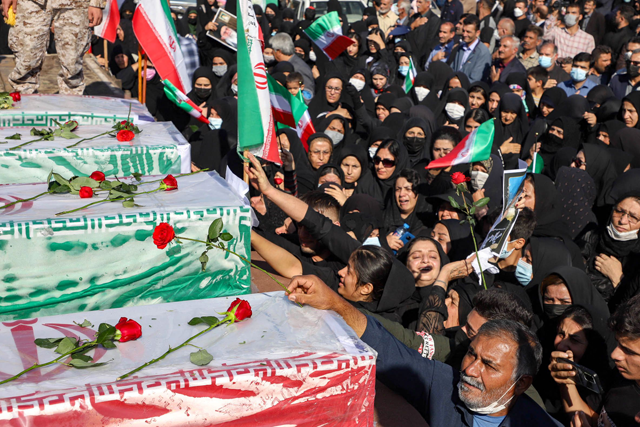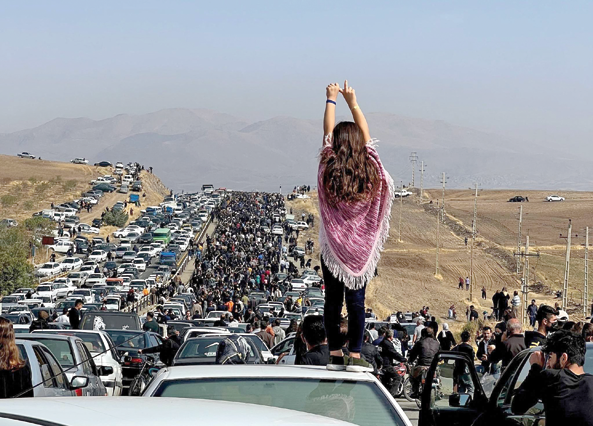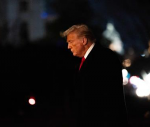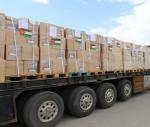You are here
47 children among at least 378 killed in Iran crackdown — new toll
By AFP - Nov 19,2022 - Last updated at Nov 19,2022

Iranians mourn in front of the coffins of people killed in a shooting attack, during their funeral in the city of Izeh in Iran's Khuzestan province, on Friday (AFP photo)
PARIS — Iranian security forces have killed at least 378 people, including 47 children, in a crackdown on protests sparked by Mahsa Amini's death, a rights group said in an updated toll on Saturday.
The Islamic republic has been gripped by protests that erupted over Amini's death on September 16, three days after her arrest for an alleged breach of the country's strict dress code for women.
The protests were fanned by fury over the dress rules for women, but have grown into a broad movement against the theocracy that has ruled Iran since the 1979 revolution.
"At least 378 protesters, including 47 children, have been killed by the oppressive forces since September 16," Iran Human Rights director Mahmood Amiry-Moghaddam told AFP.
The figure represents an increase of 36 since the Norway-based group issued its previous toll on Wednesday.
It includes at least 123 people killed in the province of Sistan-Baluchistan, on Iran's southeastern border with Pakistan, 40 in both Kurdistan and Tehran provinces and 39 in West Azerbaijan province.
Iran Human Rights warned that the regime had been mounting a "campaign of spreading lies" ahead of a meeting of the UN Human Rights Council next week.
"They have two goals by attributing the killing of the protesters to terrorist groups like Daesh," Amiry-Moghaddam said, referring to the Daesh terror group.
"They want to use it as an excuse for more widespread use of live ammunition," he told AFP.
"And they also want to influence countries in the UN Human Rights Council who will gather on November 24 in a special session considering establishing an independent investigation and accountability mechanism" over the crackdown in Iran, he added.
Iran on Saturday criticised the international community's "silence" towards acts of violence in the country during the protests.
The Islamic republic has has accused its foreign foes, including Britain, Israel and the United States, of fomenting the unrest.
On Saturday Iran's foreign ministry hit out at the "deliberate silence of foreign promoters of chaos and violence in Iran in the face of... terrorist operations in several Iranian cities".
"It is the duty of the international community and international assemblies to condemn the recent terrorist acts in Iran and not to provide a safe haven for extremists," it said in a statement.
On Wednesday, 10 people including a woman, two children and a security officer were killed in two separate attacks in the cities of Izeh and Isfahan, according to state media and a hospital source.
Two members of Iran's pro-government Basij paramilitary force were stabbed to death in the northeastern city of Mashhad while trying to intervene against "rioters", according to state news agency IRNA.
A suspect has been arrested, the judiciary's website announced.
Foreign Minister Hossein Amir-Abdollahian on Saturday said foreign powers were trying to exert “maximum pressure” on Tehran.
“In recent days and weeks, the enemies of the Islamic republic have tried to influence the situation in Iran,” Amir-Abdollahian said.
He accused arch-enemy the United States, as well as Britain, France and Germany, of supporting actions that “resulted in terrorist attacks” including in the cities of Izeh and Shiraz.
Last week Amir-Abdollahian accused Western governments of “promoting violence and teaching [protesters] to make weapons and Molotov cocktails via social networks and the media”.
Washington and the three European countries had taken a motion which the International Agency for Atomic Energy (IAEA) on Thursday approved, criticising Iran’s lack of cooperation with the UN nuclear watchdog.
It was the second resolution of its kind within six months and came during an impasse over undeclared uranium particles found in Iran.
The impasse over the IAEA’s probe comes as wider talks to revive a 2015 nuclear deal between Iran and world powers are stalled.
Amir-Abdollahian said that, earlier this month, Iranian officials had had a “constructive meeting” with IAEA chief Rafael Grossi.
“Suddenly, in order to influence the domestic environment and to exert maximum pressure, and in continuation of the extremely hypocritical policy of the United States, they suddenly put a resolution against Iran on the table — and once more abuse of the agency for political purposes,” Amir-Abdollahian said.
Related Articles
PARIS — Iranian security forces have killed at least 537 people in a crackdown on protests that erupted in September, a rights group said on
PARIS, France — Iranian security forces have killed at least 448 people in a crackdown on protests that began in mid-September, over half in
PARIS — The mother of an Iranian teen who died after joining protests over Mahsa Amini's death accused the authorities of murdering her, in
















